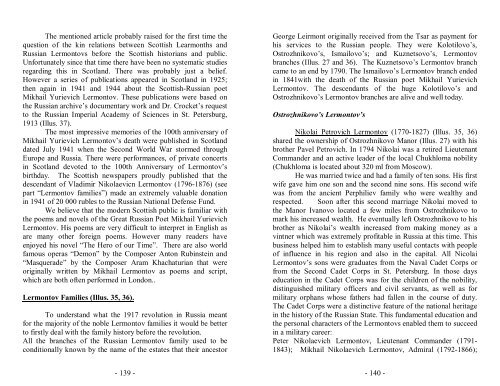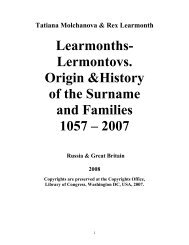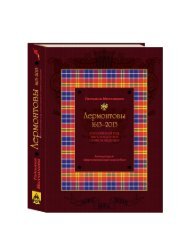LEARMONTH-LERMONTOV. A HYISTORY OF THE NAME AND FAMILIES
By Tatiana Molchanova and Rex Learmonth, 2011
By Tatiana Molchanova and Rex Learmonth, 2011
- No tags were found...
Create successful ePaper yourself
Turn your PDF publications into a flip-book with our unique Google optimized e-Paper software.
The mentioned article probably raised for the first time the<br />
question of the kin relations between Scottish Learmonths and<br />
Russian Lermontovs before the Scottish historians and public.<br />
Unfortunately since that time there have been no systematic studies<br />
regarding this in Scotland. There was probably just a belief.<br />
However a series of publications appeared in Scotland in 1925;<br />
then again in 1941 and 1944 about the Scottish-Russian poet<br />
Mikhail Yurievich Lermontov. These publications were based on<br />
the Russian archive’s documentary work and Dr. Crocket’s request<br />
to the Russian Imperial Academy of Sciences in St. Petersburg,<br />
1913 (Illus. 37).<br />
The most impressive memories of the 100th anniversary of<br />
Mikhail Yurievich Lermontov’s death were published in Scotland<br />
dated July 1941 when the Second World War stormed through<br />
Europe and Russia. There were performances, of private concerts<br />
in Scotland devoted to the 100th Anniversary of Lermontov’s<br />
birthday. The Scottish newspapers proudly published that the<br />
descendant of Vladimir Nikolaevicn Lermontov (1796-1876) (see<br />
part “Lermontov families”) made an extremely valuable donation<br />
in 1941 of 20 000 rubles to the Russian National Defense Fund.<br />
We believe that the modern Scottish public is familiar with<br />
the poems and novels of the Great Russian Poet Mikhail Yurievich<br />
Lermontov. His poems are very difficult to interpret in English as<br />
are many other foreign poems. However many readers have<br />
enjoyed his novel “The Hero of our Time”. There are also world<br />
famous operas “Demon” by the Composer Anton Rubinstein and<br />
“Masquerade” by the Composer Aram Khachaturian that were<br />
originally written by Mikhail Lermontov as poems and script,<br />
which are both often performed in London..<br />
Lermontov Families (Illus. 35, 36).<br />
To understand what the 1917 revolution in Russia meant<br />
for the majority of the noble Lermontov families it would be better<br />
to firstly deal with the family history before the revolution.<br />
All the branches of the Russian Lermontov family used to be<br />
conditionally known by the name of the estates that their ancestor<br />
George Leirmont originally received from the Tsar as payment for<br />
his services to the Russian people. They were Kolotilovo’s,<br />
Ostrozhnikovo’s, Ismailovo’s; and Kuznetsovo’s, Lermontov<br />
branches (Illus. 27 and 36). The Kuznetsovo’s Lermontov branch<br />
came to an end by 1790. The Ismailovo’s Lermontov branch ended<br />
in 1841with the death of the Russian poet Mikhail Yurievich<br />
Lermontov. The descendants of the huge Kolotilovo’s and<br />
Ostrozhnikovo’s Lermontov branches are alive and well today.<br />
Ostrozhnikovo’s Lermontov’s<br />
Nikolai Petrovich Lermontov (1770-1827) (Illus. 35, 36)<br />
shared the ownership of Ostrozhnikovo Manor (Illus. 27) with his<br />
brother Pavel Petrovich. In 1794 Nikolai was a retired Lieutenant<br />
Commander and an active leader of the local Chukhloma nobility<br />
(Chukhloma is located about 320 ml from Moscow).<br />
He was married twice and had a family of ten sons. His first<br />
wife gave him one son and the second nine sons. His second wife<br />
was from the ancient Perphiliev family who were wealthy and<br />
respected. Soon after this second marriage Nikolai moved to<br />
the Manor Ivanovo located a few miles from Ostrozhnikovo to<br />
mark his increased wealth. He eventually left Ostrozhnikovo to his<br />
brother as Nikolai’s wealth increased from making money as a<br />
vintner which was extremely profitable in Russia at this time. This<br />
business helped him to establish many useful contacts with people<br />
of influence in his region and also in the capital. All Nicolai<br />
Lermontov’s sons were graduates from the Naval Cadet Corps or<br />
from the Second Cadet Corps in St. Petersburg. In those days<br />
education in the Cadet Corps was for the children of the nobility,<br />
distinguished military officers and civil servants, as well as for<br />
military orphans whose fathers had fallen in the course of duty.<br />
The Cadet Corps were a distinctive feature of the national heritage<br />
in the history of the Russian State. This fundamental education and<br />
the personal characters of the Lermontovs enabled them to succeed<br />
in a military career:<br />
Peter Nikolaevich Lermontov, Lieutenant Commander (1791-<br />
1843); Mikhail Nikolaevich Lermontov, Admiral (1792-1866);<br />
- 139 -<br />
- 140 -






